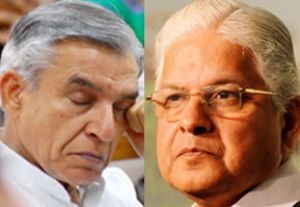New Delhi, May 6: BJP today said new submissions by CBI to the Supreme Court show government had made significant changes in the agency's status report on Coalgate scam and insisted it will support Bills on food security and land acquisition only after the Railway and Law Ministers quit.
The CBI affidavit in the Supreme Court today gave fresh ammunition to the main Opposition which charged the alterations made at the behest of Law Minister Ashwani Kumar were "damaging" and aimed at protecting the government on the coal mines allocation issue.
Referring to Para 19 of the CBI affidavit, Leader of the Opposition in Rajya Sabha Arun Jaitley said the portion where the probe agency had stated that it is not clear on what basis weightage was given to those who got the mining contracts have been removed at the instance of the minister.
Similarly, the broadsheets which were part of the CBI report on coal block allotments have also been omitted. Another significant change is removal of the section where the agency wants to know why the criteria of auction suggested by CAG in 2004 has not been followed even till 2010.
"These are extremely major changes... The investigation was directed at the Coal Minister and the Prime Minister. In a way, the report was shown to possible suspects," Jaitley said.
On the issue of Railway Minister P K Bansal's nephew's alleged involvement in the bribery case for a plum posting in the Railway, Jaitley said there is a "rythm" in the way the files moved and the money paid.
"The person who was given the bribes is an alter ego of the Railway Minister in politics and business," he said, and asked "why should strangers be paid bribes?"
Leader of the Opposition in Lok Sabha Sushma Swaraj expressed her ire at government's attempt to get the Food Security Bill passed in the House amid the din.
She said BJP wants this legislation and the Land Acquistition Bill be passed but this is possible only after Bansal and Kumar quit.





Comments
Add new comment